Related Research Articles

Slack-key guitar is a fingerstyle genre of guitar music that originated in Hawaii. This style of guitar playing involves altering the standard tuning on a guitar from E-A-D-G-B-E, which has been used for centuries, so that strumming across the open strings will then sound a harmonious chord, typically an open major. This requires altering or "slacking" certain strings, which is the origin of the term "slack key". The style typically features an alternating-bass pattern, played by the thumb on the lower two or three strings of the guitar, while the melody is played by the fingers on the three or four highest strings. There are as many as fifty tunings that have been used in this style of playing, and tunings were once guarded fiercely and passed down as family secrets. In the early 20th century, the steel guitar and the ukulele gained wide popularity in America, but the slack-key style remained a folk tradition of family entertainment for Hawaiians until about the 1960s and 1970s during the second Hawaiian renaissance.
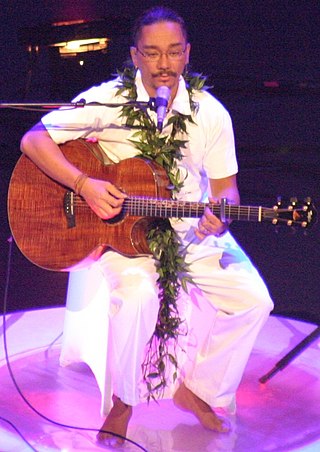
Carleton Lewis Kealiʻinaniaimokuokalani Reichel popularly known as Kealiʻi Reichel, is a popular and bestselling singer, songwriter, choreographer, dancer, chanter, scholar, teacher, and personality from Hawaiʻi. He has spent his life educating the world about Hawaiian culture through music and dance.

Jake Shimabukuro is a ukulele virtuoso and composer from Hawaii known for his fast and complex finger work. His music combines elements of jazz, blues, funk, rock, bluegrass, classical, folk, and flamenco. Shimabukuro has written numerous original compositions, including the entire soundtracks to two Japanese films, Hula Girls (2007) and Sideways (2009), the Japanese remake of the same name.
The Grammy Award for Best Hawaiian Music Album was an honor presented to recording artists from 2005 to 2011 for quality Hawaiian music albums. The Grammy Awards, an annual ceremony that was established in 1958 and originally called the Gramophone Awards, are presented by the National Academy of Recording Arts and Sciences of the United States to "honor artistic achievement, technical proficiency, and overall excellence in the recording industry, without regard to album sales or chart position".
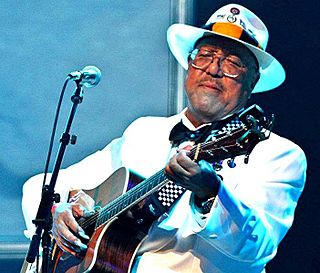
Dennis David Kahekilimamaoikalanikeha Kamakahi was a Hawaiian slack key guitarist, recording artist, music composer, and Christian minister. He was a three-time Grammy Award winner, and in 2009 he was inducted into the Hawaiian Music Hall of Fame.

Dennis Pavao, was one of several Hawaiian musicians who, during the 1970s, led a Hawaiian music renaissance, reviving Hawaiian music, especially "ka leo ki'eki'e," or Hawaiian falsetto singing. Along with his cousins, Ledward and Nedward Kaʻapana, Pavao started the group Hui ʻOhana. Hui ʻOhana became the premier falsetto group in Hawaiʻi. After the breakup of Hui ʻOhana, Dennis Pavao moved on to pursue a solo career.
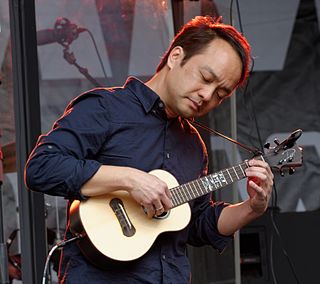
Daniel Ho is an American musician, composer and producer specializing in innovative approaches to Slack-key guitar, ukulele, and Hawaiian music. He has recorded 18 solo albums, some of which have won or were nominated for Grammy Awards, and has produced over 50 albums.
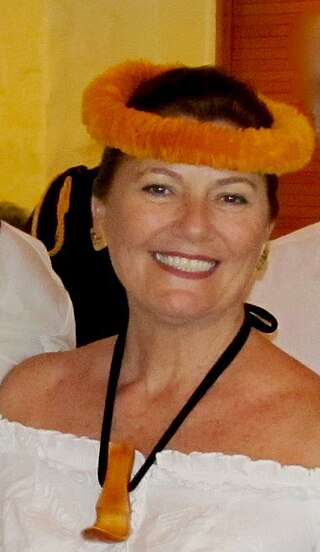
Owana Kaʻōhelelani Mahealani-Rose Salazar is an American musician and activist. She is thought to be the only female steel guitar player in Hawaiʻi trained by Jerry Byrd.

The Brothers Cazimero were a Hawaiian musical duo made up of Robert Cazimero on bass and Roland Cazimero on twelve string guitar. Robert also played piano as a solo musician. The Cazimeros got their start during the Hawaiian Renaissance with ukulele and slack-key guitarist Peter Moon's band, The Sunday Manoa, on their first recording, Guava Jam. Since that time, The Brothers Cazimero have released at least 36 recordings and three DVDs. For three decades, the group performed at the annual Lei Day Concert. They made their Carnegie Hall debut in 1989.

Benjamin Kapena Kalama was an American singer with a honey-voiced falsetto. He is credited with discovering and nurturing Alfred Apaka, and was part of several groups. Until the day Apaka died, Kalama was coaching and arranging music for him.
Kamuela Kahoano is a singer/songwriter, painter/visual artist and music producer from Honolulu, Hawaii. His music has elements of acoustic, folk, indie and alternative with Hawaiian influences. He performs solo and was formerly the lead singer of the band Analog(ic). He is an accomplished player of both the ukulele and guitar, playing both left-handed; he also plays the djembe. Kahoano claims many influences, including Coldplay, U2 and the Beatles.

Eric Lee is a Hawaiian musician, singer, songwriter, and producer. His work has appeared on more than 30 albums, including his work with The Kanile'a Collection, Nā Kama, The Ka'ala Boys, The Mākaha Sons, and his solo albums, Crossroads, Kawehilani, and his Twentieth Anniversary Anthology.
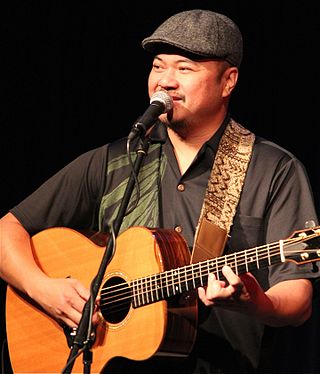
Patrick Landeza is a contemporary Hawaiian slack key guitarist. He is the first mainland-born Hawaiian to win a Nā Hōkū Hanohano music award. He was born in Berkeley, California on June 23, 1972.
The Nā Hōkū Hanohano Awards, occasionally called the Nā Hōkū Awards or Hoku Awards, are the premier music awards in Hawaii. They are considered to be Hawaii's equivalent of the Grammy Awards. "Nā Hōkū Hanohano" means "Stars of Distinction" in Hawaiian – "hōkū" means "star", "nā" makes it plural, and "hanohano" means "glorious, worthy of praises". The awards were founded in 1978 by radio personality Krash Kealoha of KCCN-AM, a radio station which focused on traditional Hawaiian music. He launched the first awards with the support of the owner of the radio station Sydney Grayson, and his fellow DJs Kimo Kahoʻāno and Jacqueline “Skylark” Rossetti.

Kimié Kauikeolani Miner better known as Kimié, is an Grammy Award nominated producer, American singer-songwriter and musician of Native Hawaiian and Portuguese descent. In November 2019 Miner earned her first Grammy Award nomination for the compilation album titled "Hawaiian Lullaby" as a producer along with producer Imua Garza. It was released in 2019 under her label Haku Collective. Hawaiian Lullaby was nominated in the 62nd Annual Grammy Awards under the Best Regional Roots Music Album category. Miner is an independent artist formerly managed by Kimo Kennedy of Arium Music and Kekoa Kapua of FR Management.

Cyril Pahinui was a slack-key guitarist and singer of Hawaiian music.

Jaye Nāpua Greig-Nakasone, known professionally as Nāpua Greig, is a Hawaiian musician, vocalist, songwriter, record producer, kumu hula, and educator from Maui, Hawaii. Known primarily for her contributions as kumu hula of Hālau Nā Lei Kaumaka O Uka, she arranges traditional Hawaiian music as well, performing and recording with instruments such as ukulele, ipu, and other traditional Hawaiian hula implements. She has released four solo albums, each earning a Nā Hōkū Hanohano Award.

Raiatea Mokihana Maile Helm is a Hawaiian music vocalist from Molokaʻi, Hawaiʻi. She has earned four Na Hoku Hanohano awards, as well as two Grammy nominations for Best Hawaiian Music Album.
Nā Palapalai is a Hawaiian music band, originally founded in Hilo, Hawaii. Founded by Kuana Torres Kahele, Kapulanakehau "Kehau" Tamure, and Keao Costa. The group arranges traditional and contemporary Hawaiian music, performing and recording with instruments such as ukulele, guitar, ipu, and upright bass. The majority of the lyrics are written and performed in the Hawaiian language. The group has released a total of eight albums each earning multiple Na Hoku Hanohano Awards, including Group of the Year. Several have charted in the top five on the Billboard Top World Albums chart,
A‘ea‘e is a Hawaiian music group composed of Keola Donaghy, Tarvin Makia, Kenneth Makuakāne, Māpuana Makia and Jeff Dayton. The group was established in 2022, and released its debut EP on December 30, 2022. The release included a vocal performance by Māpuana Makia. A‘ea‘e was entered in ten categories for the 46th Annual Nā Hōkū Hanohano Awards and a finalist in four categories. They were honored with two awards - Hawaiian EP of the Year and as Group of the Year at the Awards program held on July 1, 2023 at the Hawaii Theatre.
References
- ↑ Siporin, Steve (1992). "Introduction". American Folk Masters: The National Heritage Fellows. New York: Harry N. Abrams, Inc. in association with The Museum of International Folk Art, Santa Fe, New Mexico. pp. 14–21. ISBN 0810919176. OCLC 24699109.
- ↑ Berger, John (August 22, 2008). "Slack-key master Ledward Kaapana celebrates his 60th". Honolulu Star-Bulletin. Retrieved July 29, 2018.
- 1 2 3 4 5 "Ledward Kaapana". National Endowment for the Arts. September 15, 2011. Retrieved April 1, 2024.
- ↑ Berger, John (May 28, 2011). "Lifetime Achievement Awards: Then and now". Honolulu Star-Advertiser. Retrieved April 1, 2024.
- ↑ "Led Kaapana Discography" . Retrieved February 5, 2012.
- ↑ "Slack Key Guitar Book". Archived from the original on January 4, 2011. Retrieved January 25, 2008.
- ↑ Enomoto, Kekoa Catherine (December 9, 2005). "Grammy nominations excite local artists". Maui News. Archived from the original on October 28, 2006. Retrieved October 18, 2017.
- ↑ "Artist Ledward Kaapana". www.grammy.com. The Recording Academy. 2017. Retrieved October 18, 2017.
- ↑ "NEA National Heritage Fellowships 2011". www.arts.gov. National Endowment for the Arts. Archived from the original on May 21, 2020. Retrieved January 31, 2021.